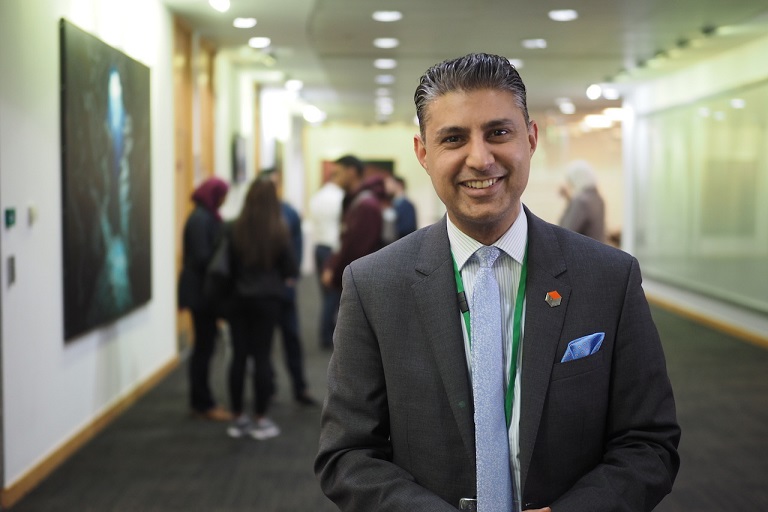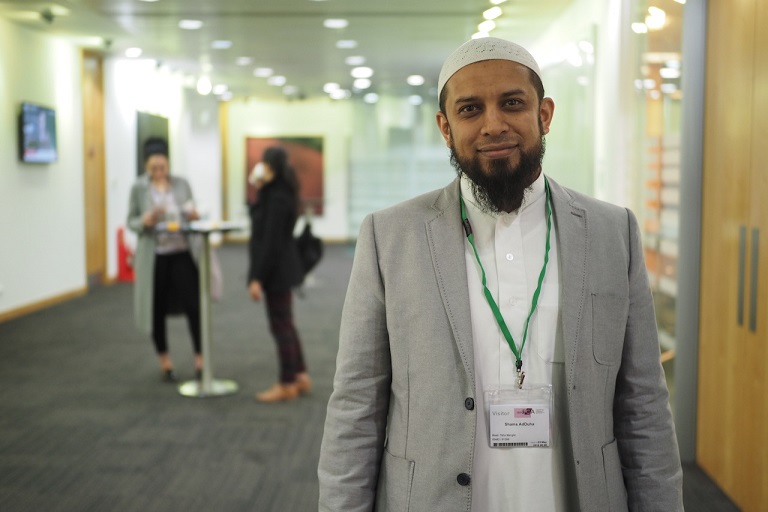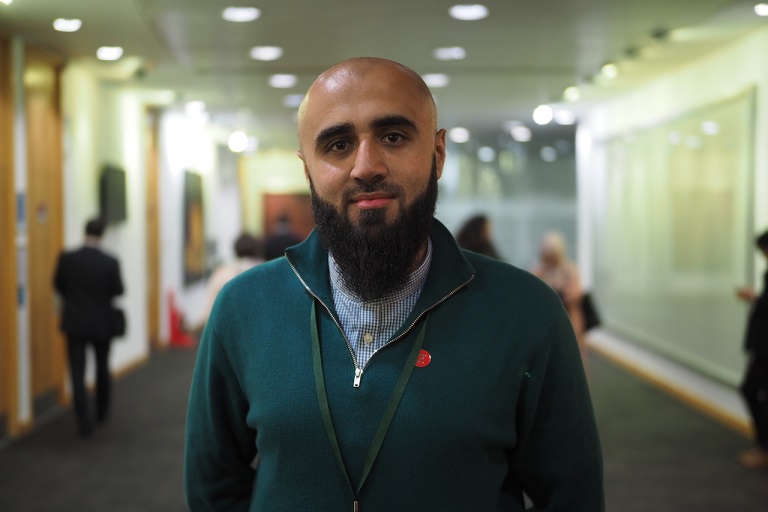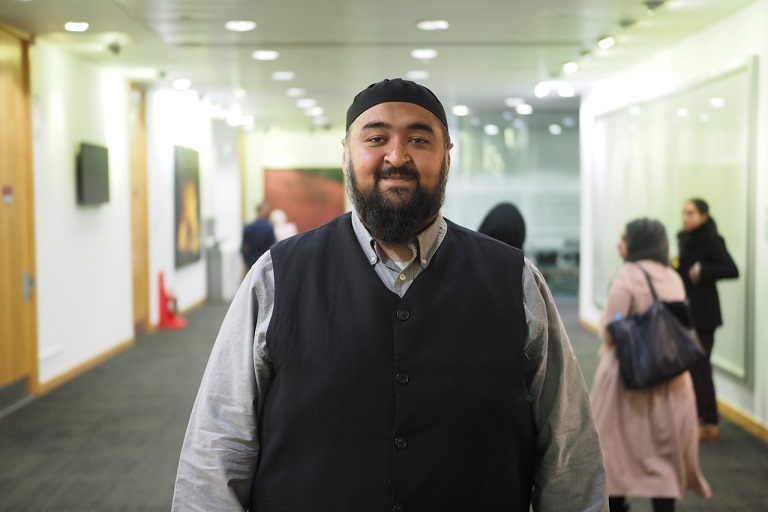LONDON – Over 150 British Muslims came together to an event organized by the Financial Conduct Authority’s Muslim network entitled ‘How to develop an optimistic mindset.’
Participants included those mostly working in financial services, but also teachers, nurses, and pharmacists amongst others.
The evening brought a variety of speakers such as Hamza Saghir from the Cube Network, Khaled Jamal from Human Appeal, Shams Ad Duha from Ebrahim College, Usman Malik from the National Zakat Foundation, and the keynote speaker, Navaid Aziz. The event concluded with a meal of pizzas, sandwiches, and a selection of canape-style desserts.

Cube, Hamza Saghir
Hamza Saghir:
“When I started my city life. One of my roles as a graduate, there were no prayer facilities. I had to pray in a stairwell in a fire exit. 15 years on, our struggle has moved on. Now it is no longer about a prayer mat. No longer about halal food in the workplace. In that respect, our struggle and what we want to bring, has also moved on.
“We have set up numerous networks, where there weren’t any. The power of these networks can only continue if people come forward.
“From the government and the Muslim Council of Britain, there are two areas that have been identified. Unless we invest in these areas, our identity as Muslims will be compromised. One is the youth. There is no safe place for them because they have been consistently bombarded by the media. Their identity is at a crisis. This is something the government is recognizing, mental wellbeing.”

– Shams AdDuha
Shams Ad Duha:
“I am particularly concerned about education that is there for the preservation of faith and the furtherance of faith. Many of you, your education at the university, at whatever level, was Islamic.
“At any one time in our history, like now, and in the past, institutions that are responsible for faith education are fundamental to this outlook. We didn’t survive as an empire, but we did as a faith. Why? Because central to safeguarding Islam as a faith is to safeguard knowledge. In particular, the knowledge that is central to our faith.
“If you strip things down to what matters to God, the conversation simplifies. It wouldn’t matter to God, one single bit if we lived in caves, but as believers. It does not matter to God if we live in a tower block, a mansion, or in a cave. All God cares about is if you live with faith: ‘You are elevated if you are believers.’”
“We are very fortunate that our forefathers when they arrived in the UK in the 60s and 70s didn’t just think about mosques, they thought maktab. Go to European Muslim communities, they do not have this.
“When it comes to independent Islamic education in the community, almost without exception you will find that is under resourced, understaffed, and neglected by philanthropy. We have multi-million-pound mosques, however, no equivalent exists for Islamic education.

– Usman Malik, National Zakat Foundation
Usman Malik:
“Our understanding of zakat is that it is there to alleviate poverty. But how does zakat aim to increase our devotion, our commitment, our obedience, our relationship to God? How are we connecting our resources to deal with the challenges that we are facing? To deal with the challenges that our children will be facing? That change can only happen if we work together collectively.”

– Navaid Aziz, Muslim Public Speaker
Navaid Aziz:
“The prophet defines our relationship with God. That God is more compassionate, more loving, more caring, towards God’s slaves, than a mother is towards her child. So if one has sound belief in God, it will lead to a belief system that one will naturally be optimistic. Because either what is happening in your life is absolute good, or the good is greater than the evil. This would lead to a question that if this is the case, then punishment does not exist. But that is a miscalculation of what Ibn Taymiyyah is saying.
“A common question that I get asked as an imam is how do I know if I am being tested vs how do I know if I am being punished by God. And I always tell people that no-one knows the answer to this question besides God, and you. Because the most beloved people to God are the ones who are tested. But also God warns us that evil has spread in the lands as a result of what our hands have done. So there is a fine line between punishment and a test from God. And the only one who can answer that is yourself. If you’ve been good it’s a test from God, if you’ve been bad, it’s a punishment from God.
“But Ibn Taymiyyah concludes that this is irrelevant. For us to figure out of this is a punishment or a test is a trap from Satan. Because this becomes a distraction from that which is more important, which is, how are we meant to react to these scenarios and these situations?
“Learn to accept trials in our life. God says, ‘Does mankind think they will be left to believe and not be tested?’’ Meaning that part of being alive, part of being a belief is that you will be tested. Anticipate it, prepare for it and you will be ready when that calamity strikes.
“Your frame of mind when that calamity strikes is to be one of seeking forgiveness from God, is one of earning reward from God, is one of purification of your morality and your manners because you become humbled and humility is instilled inside of you. It is a recalculation a refocusing of your life. Calamity reminds us of what is truly important to us. Calamity reminds us of the value of time.
“As you see your mind wandering in a certain direction ask yourself questions. Is this actually logical? The more you challenge your belief systems, you will become more optimistic.
“When we talk about optimism, it is not a way of life, it is how we react to adversity. The way we develop the correct reaction to adversity is by three simple steps. 1. When adversity strikes, tracking and mapping your train of thought. 2. Focusing on our belief systems. Mistakes that we make are doing those things that make us feel guilty and naturally pessimistic.
“Things we can do to help ourselves are proactive, like the remembrance of God. And 3, challenge your belief systems at all times and don’t let it become pessimistic. You can train yourself to become optimistic.”